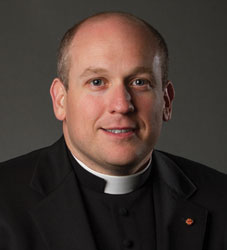 James and John, the sons of Zebedee, don’t get it. In last week’s Gospel, Mark recounted for us the story of the rich young man who came to Jesus asking what he needed to do to inherit eternal life. James and John were there. The man had lived a relatively good life by all accounts by keeping the commandments, but the Lord asked him to surrender what was most precious to him: his wealth. The Lord asked the rich young man to place his treasure in the service of the poor, but the man was not able to detach himself from this one thing
James and John, the sons of Zebedee, don’t get it. In last week’s Gospel, Mark recounted for us the story of the rich young man who came to Jesus asking what he needed to do to inherit eternal life. James and John were there. The man had lived a relatively good life by all accounts by keeping the commandments, but the Lord asked him to surrender what was most precious to him: his wealth. The Lord asked the rich young man to place his treasure in the service of the poor, but the man was not able to detach himself from this one thing  and thus left Jesus.
and thus left Jesus.
Detachment can be a very difficult virtue to master. It is something that I personally pray for on a daily basis. As disciples, we are called to live in this world without becoming entrenched in it through anything that it offers, material or immaterial. Detachment does not mean that we do not value people or things in this world but that we value God and life with him over anything and everyone else. This passage follows immediately after the story of the rich young man, both in the tenth chapter of Mark’s Gospel. While the story of the rich young man is a good example of the necessity for detachment from the material world, we see in the request made by James and John a good example for the need for detachment from immaterial things also.
“Grant that in your glory we may sit one at your right and the other at your left,” ask James and John. What then follows is our Lord’s admonition to his Apostles, and to us, not to seek glory as the world understands it. James and John most likely did not yet have an understanding of heavenly glory. For the disciple, ultimate glory is given through the cross: first through our Lord’s own suffering and death and, secondly, through our own willingness to accept our crosses daily as pathways to the Kingdom. The Lord invites his Apostles to humble themselves. Humility embraces the virtue of detachment. It seeks the good of self after God and neighbor. Humility moves us to rely on God’s goodness and grace, helping us to understand that this life is not about us and that our will must be united with God’s will.

If you want to grow in the virtues of humility and detachment, I recommend praying the Rosary. The cornerstone of the Rosary is meditating on the mysteries of salvation as presented in the Lord’s life and in the life of Mary our Blessed Mother. In between those mediations is the praying of the “Hail Mary,” the Rosary’s principal prayer. Mary is the model of humility and detachment and she remains for us, and the Church, a great intercessor to help us grow in those graces.
James and John continued to seek glory, but, through their own growth in discipleship, they came to understand that there was nothing earthly about the Lord’s glory. They ultimately chose the Lord’s glory through their own crosses and sacrifices for Christ, the proclamation of the Gospel, and the building up of the early Church. We are also invited to seek glory, but not in any form offered by this world. At the end of her life, Mary was assumed body and soul into the glory of heaven and given a share in the God’s glory by being crowned Queen of the Universe. By holding nothing back from the Lord and by offering everything to him and for him, Mary gained ultimate glory from her son; a glory that can never fade, be lost, or taken away. The Lord Jesus offers the same glory to us if we are willing to carry our own cross, united with him.
Father Christopher House is the Rector of the Cathedral and serves in various leadership roles within the diocesan curia, namely Chancellor and Vicar Judicial.